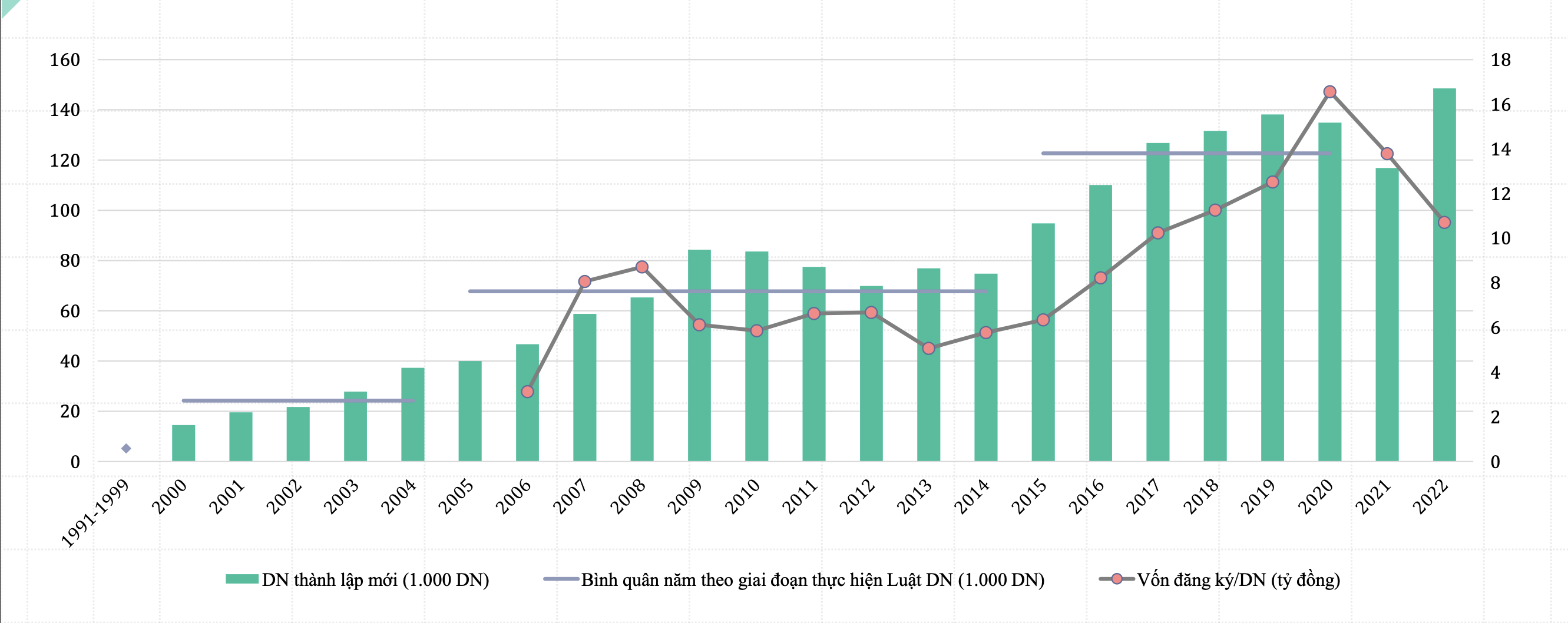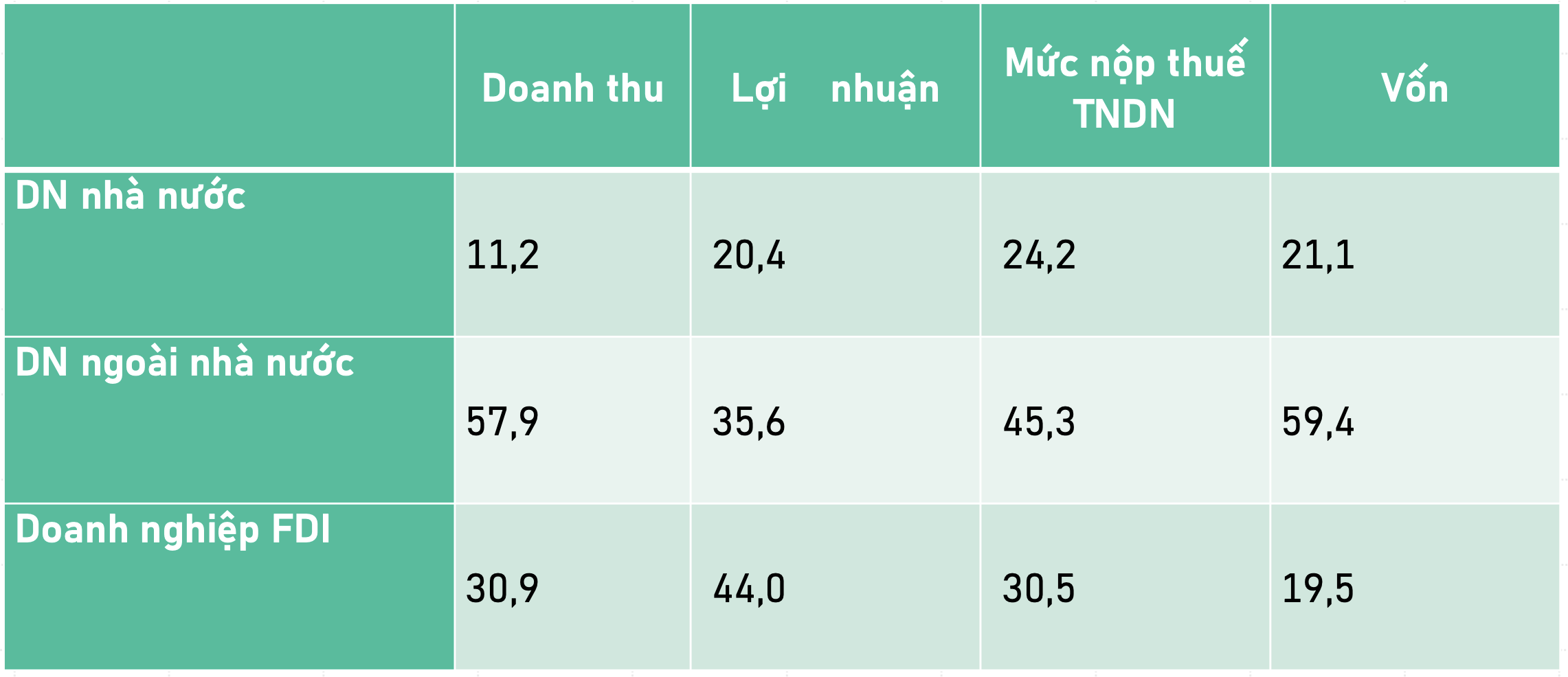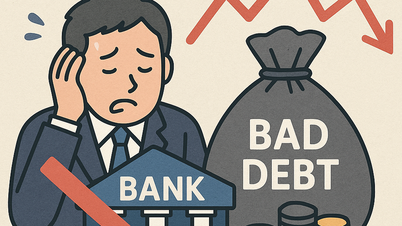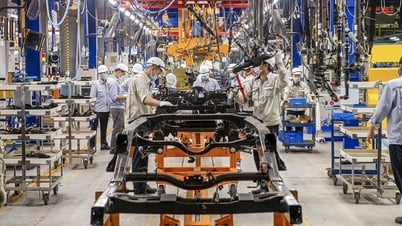According to Professor Ngo Thang Loi, National Economics University, based on the institutional characteristics of the private economy, the development of the private economy in Vietnam can be divided into four main stages. In the pre-Doi Moi period (before 1986), the private economy sector almost did not exist, only appearing in the form of small individual economies in a number of industries, accounting for about 8% of the total economic output value of the North (according to statistics in 1983). Next was the start-up period (from 1990), when the State began to recognize the long-term existence of the private economy and promulgated the Law on Private Enterprises (1990) - the first legal framework specifically for this sector.
The third stage marked the take-off of the private economy, with the completion of the legal system that eliminated legal boundaries between types of enterprises, creating a level playing field for the private sector. From 2014 to present, the Enterprise Law and Investment Law have created many opportunities for the Vietnamese private economy to develop strongly. On that basis, the position of the private economy has also been affirmed, playing the role of one of the important driving forces of economic development.
 |
| The outstanding development of the private economy in recent times |
Because of such institutional changes, the private economy has made great efforts to create outstanding development and achieved great results in recent times. Since its formation, the private economic force has grown quite strongly from investment capital and the number of enterprises. Since 2011, Vietnam's private economy has had the fastest growth rate in terms of resources and revenue, especially the growth rate in revenue and capital is higher than that of the FDI sector. Vietnam's private economy contributes 43% of GDP, using 85% of the labor force. These efforts show that the private economy is a driving force for growth and has a strong influence on the Vietnamese economy, becoming increasingly clearer.
Mr. Trinh Minh Anh - Chief of Office of the Steering Committee for International Integration ( Ministry of Industry and Trade ) shared that requirements on technical standards, environment, labor, tariffs, etc. pose great challenges for businesses.
 |
| Policy bottlenecks: many aspects lack inclusiveness between the private sector and other sectors |
Professor Ngo Thang Loi warned that the private sector, with more than 900,000 enterprises and 5.2 million business households, is currently facing many barriers. The disparity in access to resources is evident: state-owned enterprises only contribute 11.2% of the total revenue of the economy but account for 24.2% of total profits, thanks to the advantage of accessing preferential capital and special mechanisms. Meanwhile, the private sector - although the main driver of growth - has to bear the highest corporate income tax rate, along with a complex system of administrative procedures, "hidden" costs and potential legal risks.
Ms. Tran Thi Hong Minh, Director of the Institute for Policy and Strategy Studies (Central Policy and Strategy Department) suggested that in the coming time, it is necessary to remove bottlenecks in institutions, laws, and the business environment. Accordingly, it is necessary to drastically cut and simplify business conditions and optimize the process of handling administrative procedures associated with digital transformation, application of modern information and communication technology and typical technologies.
According to Prof. Dr. Pham Hong Chuong, Director of the National Economics University, to maintain sustainable growth in the long term, in addition to promoting traditional growth drivers, building a suitable economic institutional system is extremely important. An inclusive institutional system is an important foundation for a full market economy and helps encourage the participation of the majority of people in economic activities.
The Director of the National Economics University warned: "Vietnam only has 5-10 golden years to change its development trajectory. If it misses it, the dream of becoming a high-income country by 2045 will pass. Institutions are the "soft core" of growth. In the context of the golden population window about to close, not reforming institutions means losing growth momentum. This is considered a prerequisite for Vietnam to reach the upper middle-income level by 2030 and rise to the group of developed countries by 2045.
| At the National Conference to disseminate and implement the Resolution of the 11th Central Conference, 13th tenure, Prime Minister Pham Minh Chinh said that the private economic sector is the most important driving force of our country's economy. Therefore, reforming economic institutions, improving the business environment and promoting business support will be key factors to open the door to development for the Vietnamese economy. |
Source: https://thoibaonganhang.vn/loi-mo-ve-the-che-cho-su-phat-trien-khu-vuc-kinh-te-tu-nhan-163060.html





![[Photo] Prime Minister Pham Minh Chinh and Prime Minister of the Kingdom of Thailand Paetongtarn Shinawatra attend the Vietnam-Thailand Business Forum 2025](https://vphoto.vietnam.vn/thumb/1200x675/vietnam/resource/IMAGE/2025/5/16/1cdfce54d25c48a68ae6fb9204f2171a)






















![[Photo] President Luong Cuong receives Prime Minister of the Kingdom of Thailand Paetongtarn Shinawatra](https://vphoto.vietnam.vn/thumb/1200x675/vietnam/resource/IMAGE/2025/5/16/52c73b27198a4e12bd6a903d1c218846)






























































Comment (0)